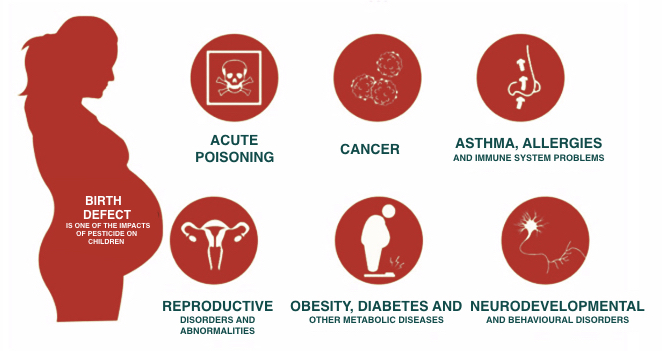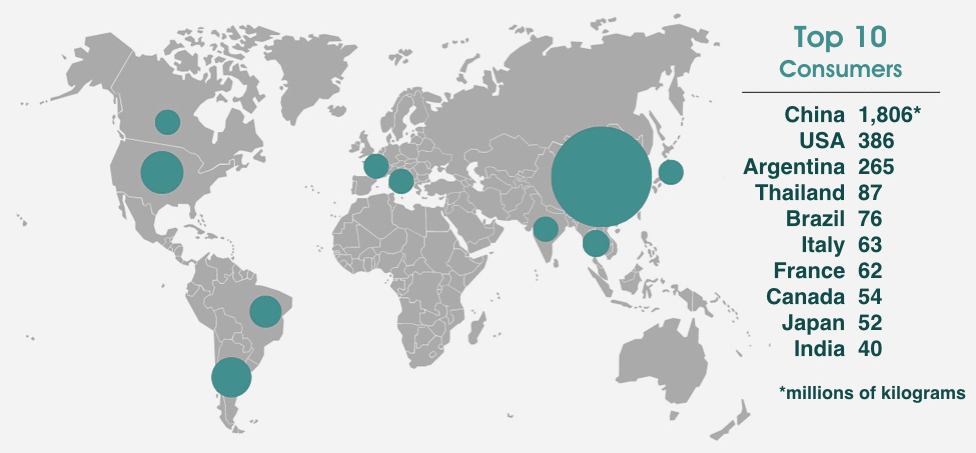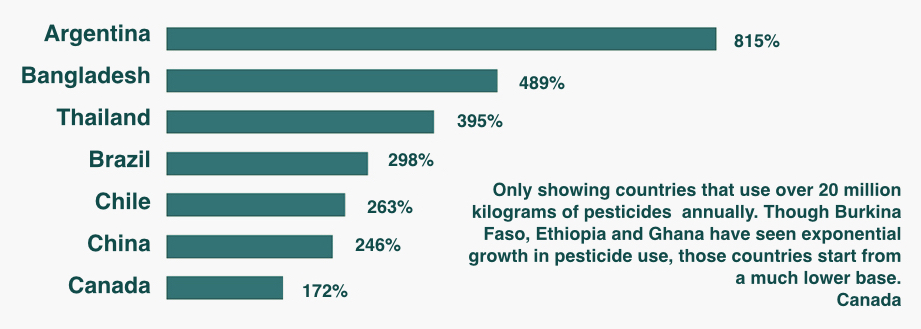“Reliance on hazardous pesticides is a short term solution that undermines the rights to adequate food and health for present and future generations.”
United Nations Report on the Right to Food, 2017
.
The United Nations Human Rights Council has released a large and convincing body of evidence that synthetic agricultural pesticides have catastrophic impacts on human health, the environment and our global food supply. The report also revealed the extent in which global corporations responsible for manufacturing these synthetic chemicals have systematically misinformed the public through aggressive marketing tactics and heavy lobbying of governments, all of which have obstructed, reformed and paralyzed global pesticide restrictions. The propaganda is so pervasive in the industry today that the UN has officially declared the situation a global human rights issue in need of immediate action.
Annual Pesticide Consumption Worldwide
(2007-2012)
.Very few people in the world today are unexposed to synthetic pesticides. An estimated two million tons of pesticides are applied to farms every single year. Monsanto, Dow and Syngenta, three of the world’s largest crop care institutions, control 65% of the $60 billion global pesticide market. By 2021, that figure is expected to grow to $78.7 billion at a compound annual growth rate of 5.5%. These multinational organizations that have a majority stake in the world’s food supply are hugely incentivized to propagate the myth that synthetics are safe and that we need them to survive. Not only do they contest scientific evidence of the hazards related to their products, but also deliberately manufacture false evidence and hide real evidence to infuse scientific uncertainty and delay regulation. They are also guilty of maintaining production of these dangerous chemicals for export despite active regulations for domestic use. The United States Environmental Protection Agency showed that, in the United States, banned, restricted, or unregistered synthetic pesticides were manufactured in 23 states for export to developing countries around the world in 2016.
Increase in Global Pesticide Use
(2007-2012)
.An estimated 250,000 people die every single year from acute pesticide poisoning, and the Pesticide Action Network found that up to 40 million people experience health issues as a direct result of both high and low levels of exposure. Such exposure is linked to cancer, Alzheimer’s and Parkinson’s disease, hormone disruption, sterility, autism and a range of neurological disorders. Additionally, since traces of synthetic pesticides have been found to remain in the environment for decades, they pose a significant threat to the ecological system upon which global food production depends. The excessive use and misuse of pesticides result in soil and water contamination, arable land degradation, loss of biodiversity and the destruction of beneficial insect populations that act as natural enemies of pests. Pervasive pesticide use has also been found to reduce the nutritional value of food.
Health Impacts from Exposure to Synthetic Pesticides
 Source: PAN International (2016)
Source: PAN International (2016)
.In one of the latest peer-reviewed scientific studies released by Nature regarding sustainable crop production, researchers found that total synthetic pesticide use could be reduced by 42% without any negative effects on productivity and profitability. That’s not to say that there is no need for pesticides. Quite the contrary! Crop care plays a key role in ensuring a healthy, safe, affordable and reliable food supply. The United Nations Food and Agricultural Organization states that without crop protection tools the world could lose up to 80% of its harvests due to damaging insects, weeds and plant disease. Rather than using synthetic solutions that exacerbate the issue of global food security, we should instead rely on natural and alternative solutions in crop care.
The global organics market, which relies on natural alternatives in crop care, was worth US$80 billion in 2016. The market has increased five-fold since 1999 and is expected to double to US$161.5 billion by 2018. This is a great example of the lack of need for these dangerous chemicals to feed the world’s population as well as the opportunity for farmers to profit from using natural alternatives.
The fact is that we can produce healthier, nutrient-rich food, with higher yields in the long term, without polluting our environment with synthetic chemicals and exhausting natural capital. We must phase out the use of synthetic agrochemicals and enforce a regulatory framework that supports a transition towards sustainable agricultural system, mitigating resource scarcity and climate change while securing a global food supply. This can be achieved with natural solutions in crop care such as neem.

